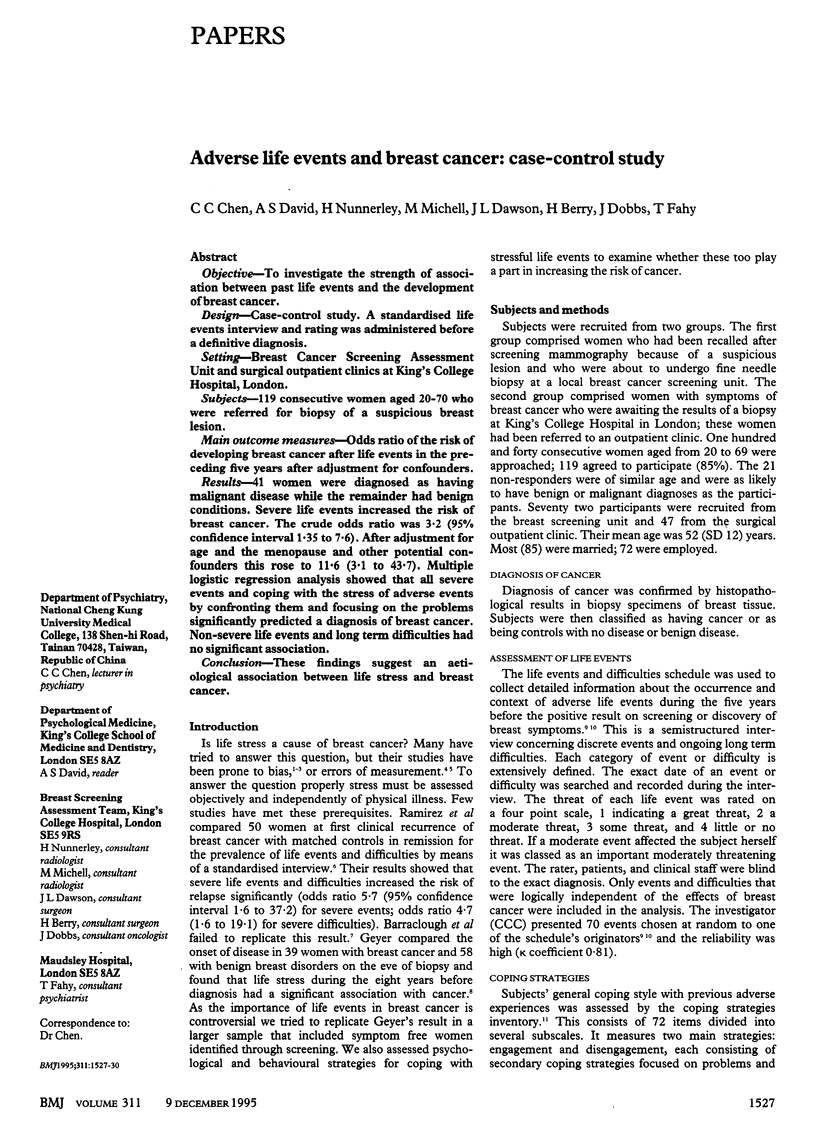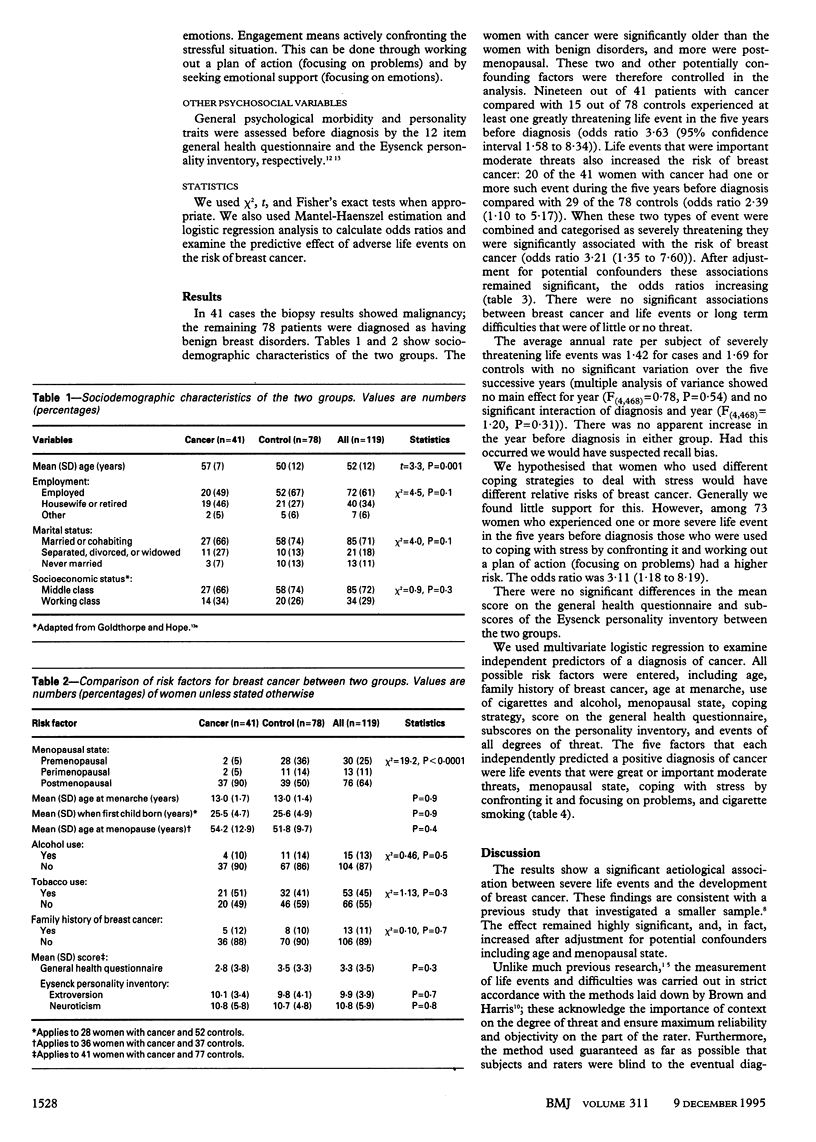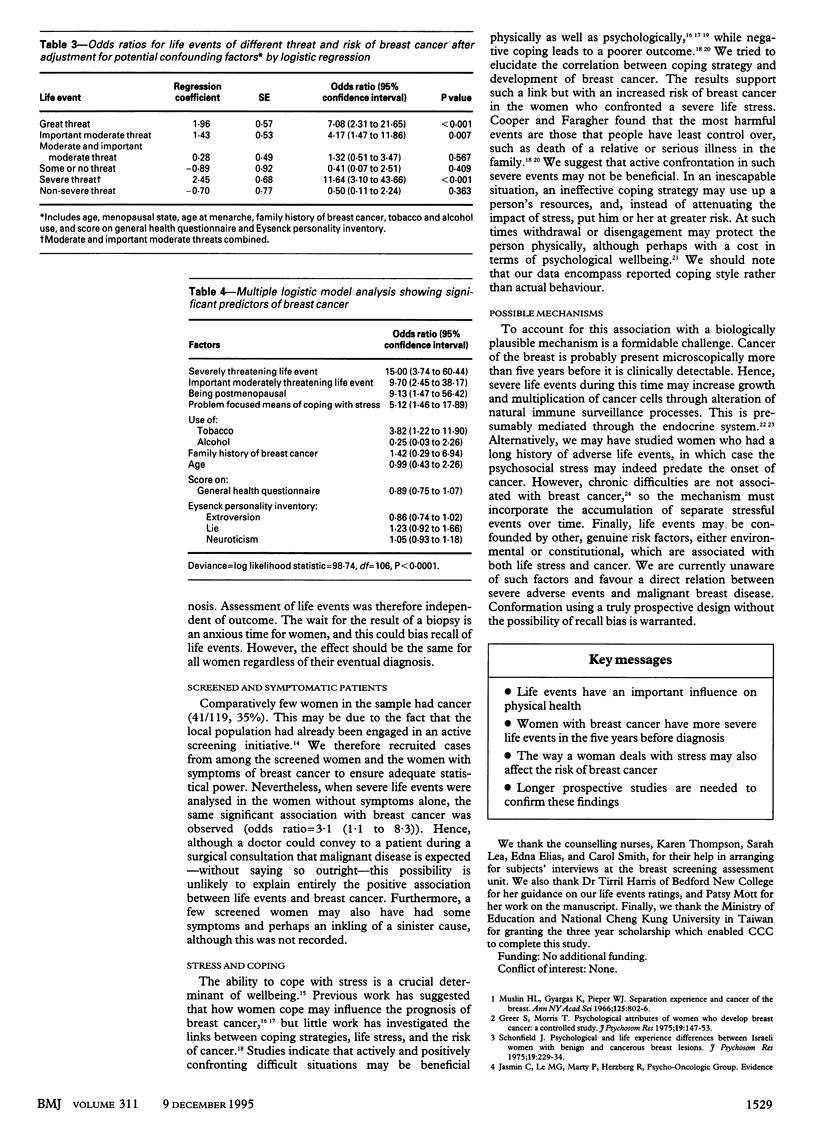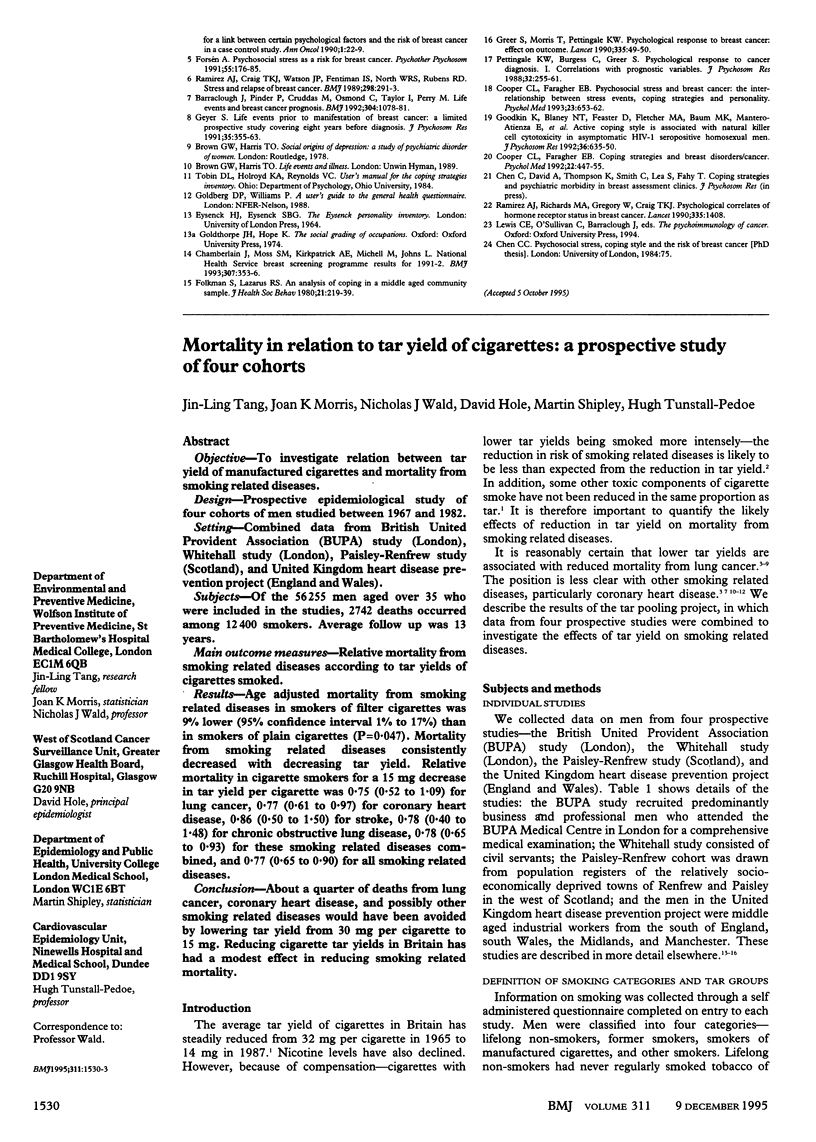Abstract
OBJECTIVE--To investigate the strength of association between past life events and the development of breast cancer. DESIGN--Case-control study. A standardised life events interview and rating was administered before a definitive diagnosis. SETTING--Breast Cancer Screening Assessment Unit and surgical outpatient clinics at King's College Hospital, London. SUBJECTS--119 consecutive women aged 20-70 who were referred for biopsy of a suspicious breast lesion. MAIN OUTCOME MEASURES--Odds ratio of the risk of developing breast cancer after life events in the preceding five years after adjustment for confounders. RESULTS--41 women were diagnosed as having malignant disease while the remainder had benign conditions. Severe life events increased the risk of breast cancer. The crude odds ratio was 3.2 (95% confidence interval 1.35 to 7.6). After adjustment for age and the menopause and other potential confounders this rose to 11.6 (3.1 to 43.7). Multiple logistic regression analysis showed that all severe events and coping with the stress of adverse events by confronting them and focusing on the problems significantly predicted a diagnosis of breast cancer. Non-severe life events and long term difficulties had no significant association. CONCLUSION--These findings suggest an aetiological association between life stress and breast cancer.
Full text
PDF



Selected References
These references are in PubMed. This may not be the complete list of references from this article.
- Barraclough J., Pinder P., Cruddas M., Osmond C., Taylor I., Perry M. Life events and breast cancer prognosis. BMJ. 1992 Apr 25;304(6834):1078–1081. doi: 10.1136/bmj.304.6834.1078. [DOI] [PMC free article] [PubMed] [Google Scholar]
- Chamberlain J., Moss S. M., Kirkpatrick A. E., Michell M., Johns L. National Health Service breast screening programme results for 1991-2. BMJ. 1993 Aug 7;307(6900):353–356. doi: 10.1136/bmj.307.6900.353. [DOI] [PMC free article] [PubMed] [Google Scholar]
- Cooper C. L., Faragher E. B. Coping strategies and breast disorders/cancer. Psychol Med. 1992 May;22(2):447–455. doi: 10.1017/s0033291700030397. [DOI] [PubMed] [Google Scholar]
- Cooper C. L., Faragher E. B. Psychosocial stress and breast cancer: the inter-relationship between stress events, coping strategies and personality. Psychol Med. 1993 Aug;23(3):653–662. doi: 10.1017/s0033291700025435. [DOI] [PubMed] [Google Scholar]
- Folkman S., Lazarus R. S. An analysis of coping in a middle-aged community sample. J Health Soc Behav. 1980 Sep;21(3):219–239. [PubMed] [Google Scholar]
- Geyer S. Life events prior to manifestation of breast cancer: a limited prospective study covering eight years before diagnosis. J Psychosom Res. 1991;35(2-3):355–363. doi: 10.1016/0022-3999(91)90090-b. [DOI] [PubMed] [Google Scholar]
- Goodkin K., Blaney N. T., Feaster D., Fletcher M. A., Baum M. K., Mantero-Atienza E., Klimas N. G., Millon C., Szapocznik J., Eisdorfer C. Active coping style is associated with natural killer cell cytotoxicity in asymptomatic HIV-1 seropositive homosexual men. J Psychosom Res. 1992 Oct;36(7):635–650. doi: 10.1016/0022-3999(92)90053-5. [DOI] [PubMed] [Google Scholar]
- Greer S., Morris T., Pettingale K. W., Haybittle J. L. Psychological response to breast cancer and 15-year outcome. Lancet. 1990 Jan 6;335(8680):49–50. doi: 10.1016/0140-6736(90)90173-3. [DOI] [PubMed] [Google Scholar]
- Greer S., Morris T. Psychological attributes of women who develop breast cancer: a controlled study. J Psychosom Res. 1975 Apr;19(2):147–153. doi: 10.1016/0022-3999(75)90062-8. [DOI] [PubMed] [Google Scholar]
- Muslin H. L., Gyarfas K., Pieper W. J. Separation experience and cancer of the breast. Ann N Y Acad Sci. 1966 Jan 21;125(3):802–806. doi: 10.1111/j.1749-6632.1966.tb45429.x. [DOI] [PubMed] [Google Scholar]
- Pettingale K. W., Burgess C., Greer S. Psychological response to cancer diagnosis--I. Correlations with prognostic variables. J Psychosom Res. 1988;32(3):255–261. doi: 10.1016/0022-3999(88)90066-9. [DOI] [PubMed] [Google Scholar]
- Ramirez A. J., Craig T. K., Watson J. P., Fentiman I. S., North W. R., Rubens R. D. Stress and relapse of breast cancer. BMJ. 1989 Feb 4;298(6669):291–293. doi: 10.1136/bmj.298.6669.291. [DOI] [PMC free article] [PubMed] [Google Scholar]
- Ramirez A. J., Richards M. A., Gregory W., Craig T. K. Psychological correlates of hormone receptor status in breast cancer. Lancet. 1990 Jun 9;335(8702):1408–1408. doi: 10.1016/0140-6736(90)91294-k. [DOI] [PubMed] [Google Scholar]
- Schonfield J. Psychological and life-experience differences between Israeli women with benign and cancerous breast lesions. J Psychosom Res. 1975;19(4):229–234. doi: 10.1016/0022-3999(75)90018-5. [DOI] [PubMed] [Google Scholar]


